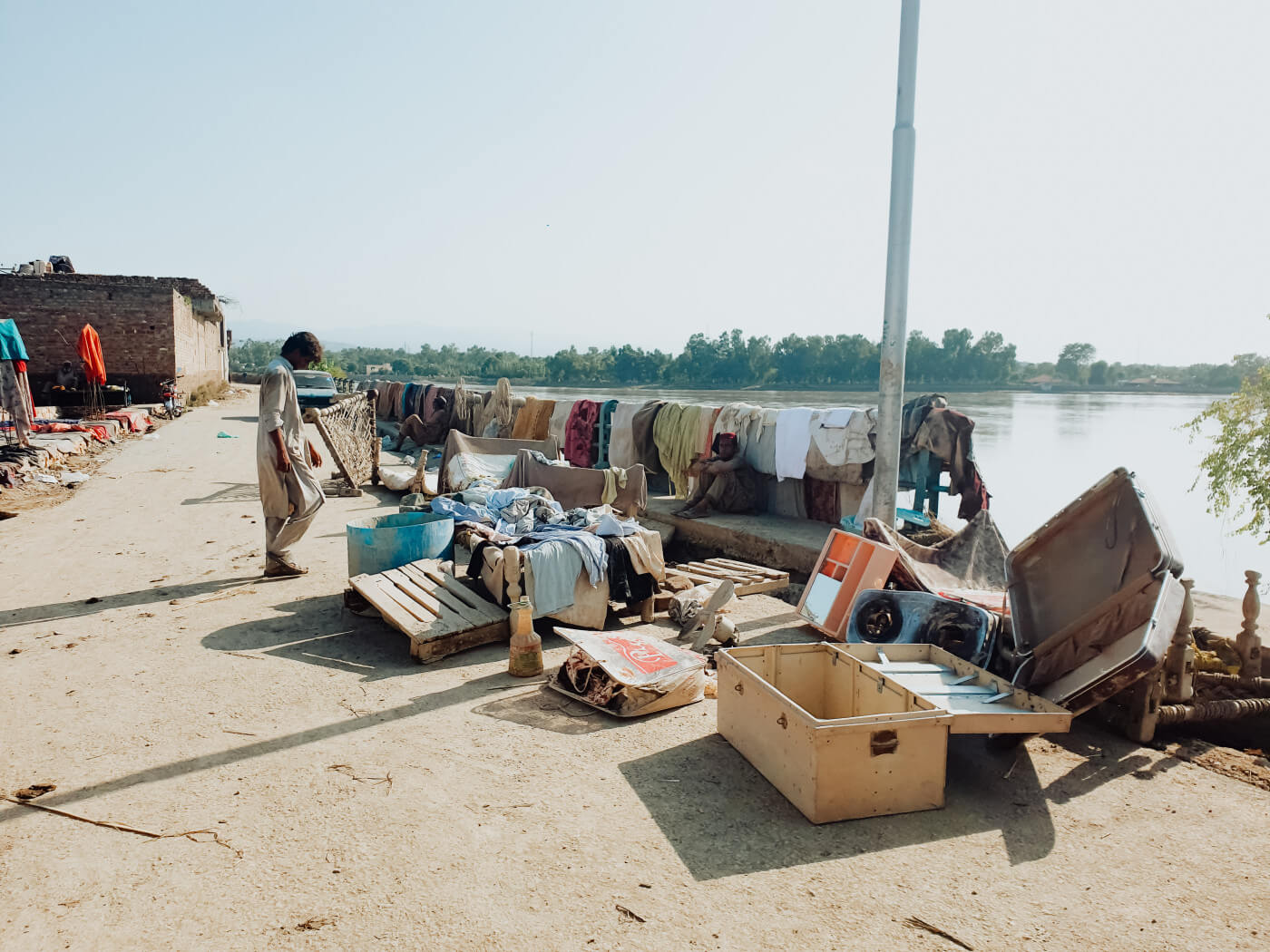Currently, one third of Pakistan is underwater. Devastating floods have swept across the country over the past few weeks, displacing millions and killing over one thousand people, including almost 400 children. Right now, Doctors Worldwide UK are in Pakistan, coordinating and working with local partners to undertake the most effective, targeted and needs-based response to the floods. Below, one of our staff members shares an eyewitness account of the destruction that the flood has caused, and the urgency with which an emergency response is needed, especially for post-flood relief.
Pakistan Floods: Eye Witness Account
We’ve been in Pakistan now for nearly 2 weeks.
Initially, we had come to Pakistan for completely different reasons, yet little did we know that soon a third of the country would be underwater, with 33 million people displaced in just a number of weeks.
Recently, we visited Charsadda and Nowshera in the province of KPK to understand the impact of the floods. The water had already receded by the time we arrived, however in its wake the floods had left communities facing the difficult and near-hopeless task of cleaning up and salvaging what little possessions they had left.
Villagers and local people showed us the water marks 6-8ft high across the walls of their homes, a tangible remnant of just how high the water had risen. We passed by houses, schools and local mosques, where we saw adults and children alike slipping and sliding as they dug away at the swathes of wet, heavy cement-like mud left in their homes and courtyards, and caked over their possessions. Although the water mostly submerged the ground floor of peoples’ homes, it was in reality two floors, if you included the basement, the most important storeroom of every home where precious goods, grains and other important possessions are kept. Losing the basement and its goods in effect made the already poor become destitute - with only the walls of their homes left standing.
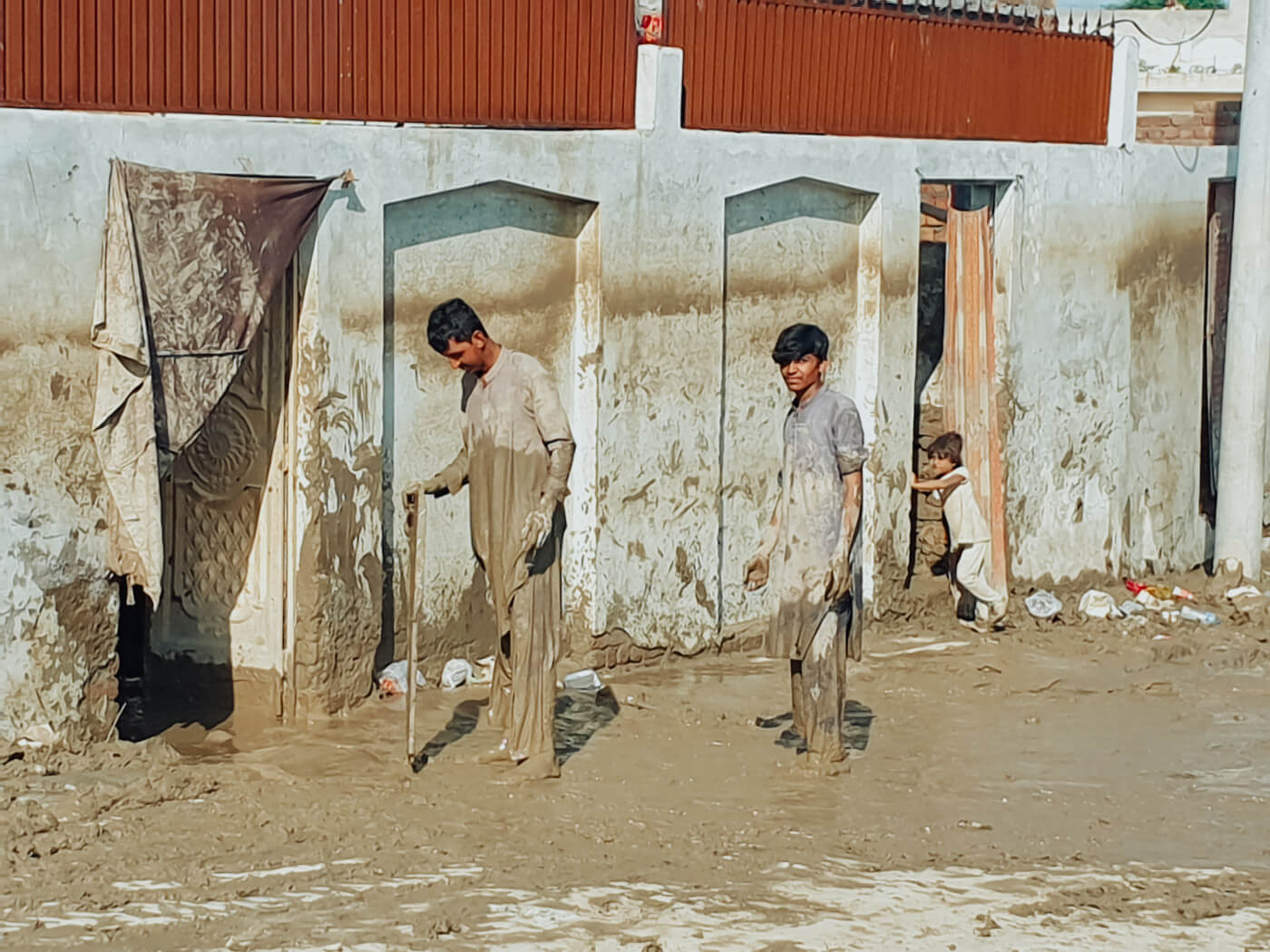
Image caption: Two boys attempt to clear the mud and water away from within and around their houses, their clothes saturated up to their chest.
During our visit to Nowshera, we were accompanied by local physicians, health advisors and high level community developers, including those who were responsible for building the water protection barrier around the main river. This flood protection barrier was built over a year ago and is the single biggest reason why the floods in Nowshera, KPK were not as destructive and devastating as other provinces. Although it had broken at one juncture due to the sheer amount and strength of the water - the complete non-existence of the barrier would have caused unimaginable damage and loss of lives. My colleague asked our guides whether the water level is currently back to normal. We were told the water is still too far inland, and that it would have been much further back a year ago, evidencing the significant impact of climate change on a country that is one of the top ten countries affected, despite being responsible for only 1% of global greenhouse emissions.
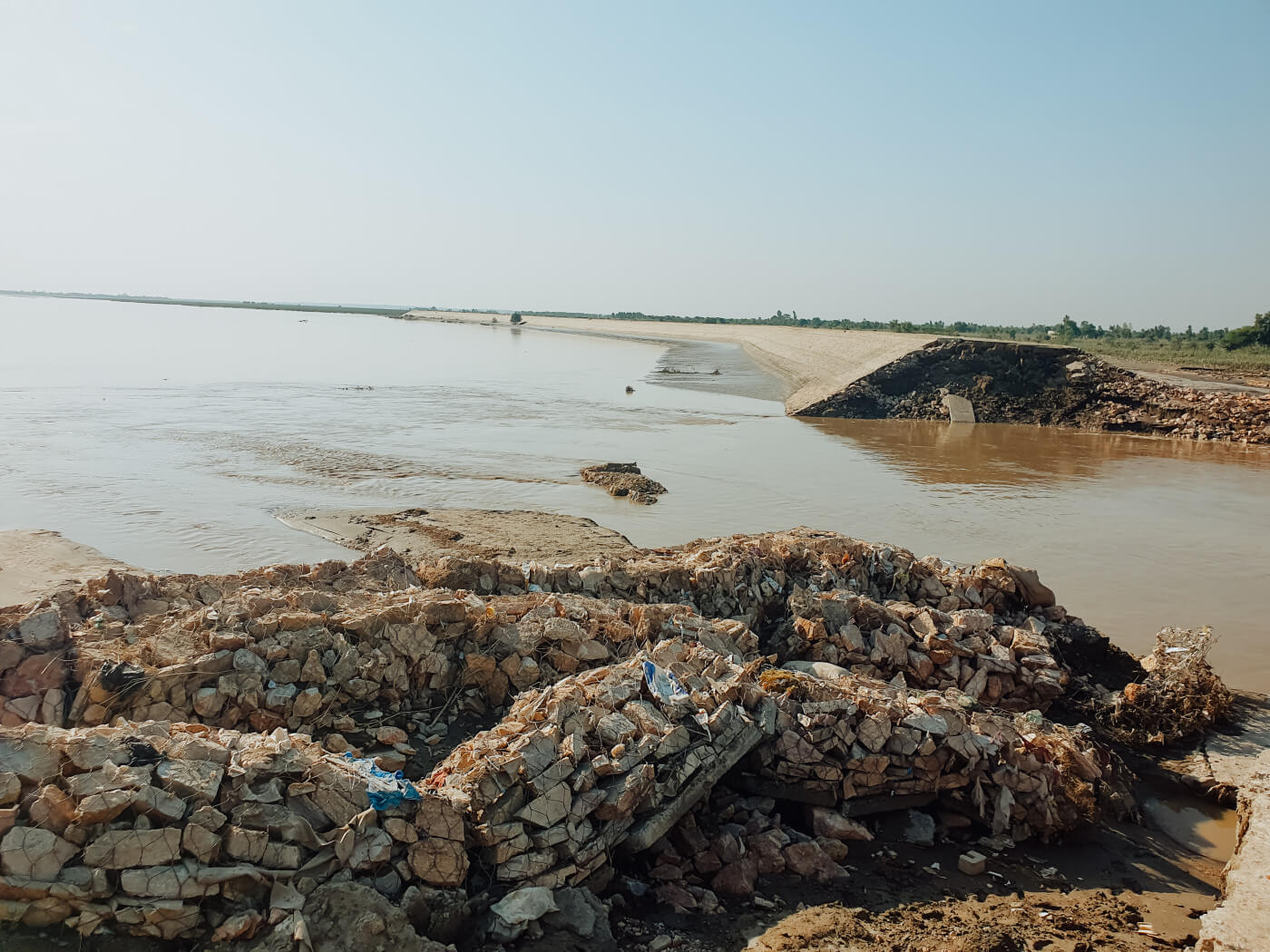 Image caption: The only break in the flood protection barrier which still saved many lives and avoided heavy destructions in Nowshera.
Image caption: The only break in the flood protection barrier which still saved many lives and avoided heavy destructions in Nowshera.
In Charsadda and Nowshera of the KPK province where we visited, the greatest need right now is not urgent relief which is currently being provided sufficiently, but support to rebuild lives and livelihoods, as well as medical care for post-flood diseases and mental trauma. We saw fields upon fields of sugarcane ready for harvest but sadly damaged at the roots by the floods in Charsadda, impacting day labourers who rely on preparing such crops to earn an income [they earn approx 700 rupees a day, equivalent to £2.78/day]. Flood damage to a local girl’s school which has not received any help yet was being cleared out by locals - equipment, books and furnishing completely destroyed with the only saving grace being the building still standing. Admirably, the children still came to school, willing to study in such muddy, wet chaos.
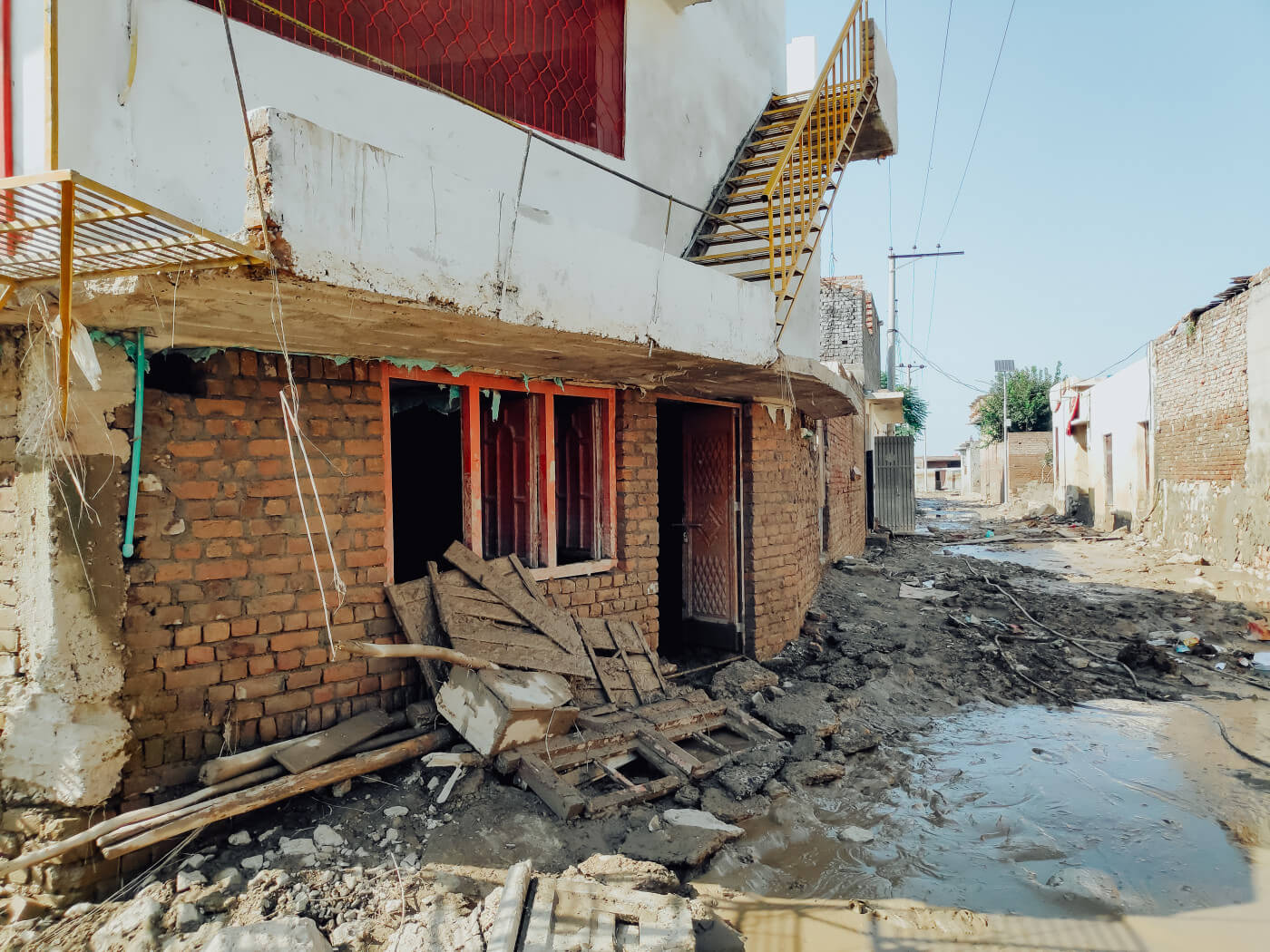
Image caption: The damage left in the wake of the floods and the clear up required with water still saturating the grounds making it an even more difficult task under the burning heat.
Healthcare access is a great need in parts of Charsadda particularly, as the quality and level of care provided was already insufficient even before the floods. Across Pakistan, approximately 5,100 Basic Health Units [BHUs] provide access to basic healthcare. Before the floods, according to local sources, it was estimated that at least 40% of them were non-functional. Now, the floods have greatly impacted that number even further in all the provinces affected. Hygiene promotion is also critical not just for immediate benefits, but to lift the standard of hygiene awareness for the future. This includes active community level health education such as hand washing, education on types of unsafe water, hygiene practices, food and utensil washing practices etc. Take for example a young boy who we saw thoroughly washing his hands using sewer water - to him, it was just water - exactly like the flood water he just survived through. But without greater health literacy or awareness campaigns, this boy could contract numerous serious and deadly diseases and infections.
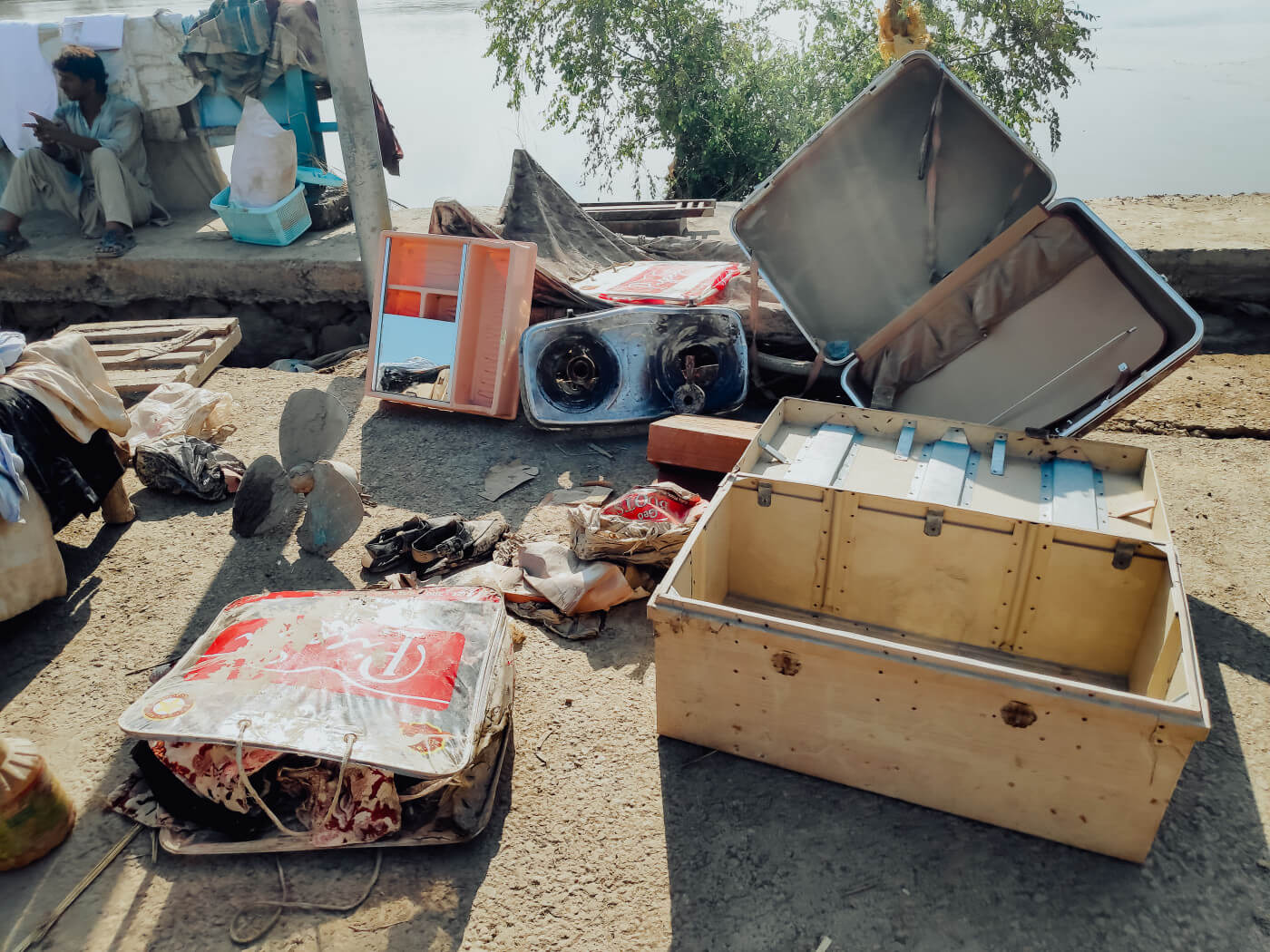 Image caption: People living near the river attempting to dry out whatever possessions they were able to salvage in hope they can reuse them.
Image caption: People living near the river attempting to dry out whatever possessions they were able to salvage in hope they can reuse them.
Thinking Long-Term: Strategic Post-Flood Relief Work
Right now, what’s worrying is the knowledge that whilst the water has receded in KPK, the monsoon season is not yet over, and there is a chance that the floods may be back. Sindh province is still under water, and it has been estimated that it will be weeks before the water starts to recede there. But the need for relief and post flood response must not be underestimated; when the cameras are gone, the social media/influencer posts have died down, and the branded fundraising campaigns have made their big bucks - the weeks and months after the floods is the time that strategic charitable activities will really matter. During the floods, there is very little charities can do beyond what is already happening, such as provision of food, tents and water. Local Pakistanis across the country have been mobilising long before the international charities got on the scene. Take for example the two separate 10-seater vans full of women from other regions coming with goods stacked up to provide relief which we witnessed during our journey back to Islamabad. Or the local medical graduates providing healthcare in a makeshift room with scores of boxes full of donated medication amidst the packed room of flood victims. Or the local Pakistani charities handing out hot meals from their pitched tents alongside the road.

Image caption: In a makeshift temporary clinic set up by local Pakistani doctors, medication is donated by local Pakistanis to help flood victims.
Donors insist on seeing immediate responses, which may not be realistic or possible, forcing charities to rely on basic relief response fundraising campaigns that are easy to raise money for, including in-kind donations [clothes, toiletries etc] that almost always oversaturate the humanitarian response, resulting in those items either being dumped, taken to the market, or sold in neighbouring countries. The role charities play can be far more long term and impactful if the funds they raise for immediate relief are then utilised in a more strategic way. For example to rebuild and flood protect clinics and to fix and improve broken latrines/toilets to reduce the spread of infections. Or to ensure regular vaccine programmes are not disrupted to protect communities from epidemics that are already under control, or training local Pakistani doctors on post-flood response and humanitarian medicine, and any other long-term activity that builds the community’s flood resilience for the future.
Today I saw a fundraising appeal for £120,000. A reputable UK organisation was hoping to train local volunteers online for the Pakistan floods. Such a massive ask, for the kind of work they were advertising, made me feel uncomfortable, and really emphasised the need for a greater focus on what we at Doctors Worldwide call ‘low cost, impact’ work. This doesn’t mean we do things cheaply, but we ensure we are accountable for every single penny and pound we receive, ensuring it has the highest impact without compromising quality. For charities like ours, £120,000 would allow us to set up several specialist maternity, neonatal and child clinics for at least 1 year across flood affected areas in Pakistan where no such medical camps/clinics exist, and potentially save thousands of pregnant mothers, babies and children’s lives. In fact, it is estimated that at least 73,000 Pakistani mothers will give birth every month in the flood affected region. Giving birth does not stop in a disaster. Without adequate facilities with access to a trained midwife and obstetrician, rehabilitated and accessible clinics and referral facilities, or safe birthing kits to help those who cannot reach a facility, the reality is that many more Pakistani mothers and newborn babies will face the prospect of death during these floods.
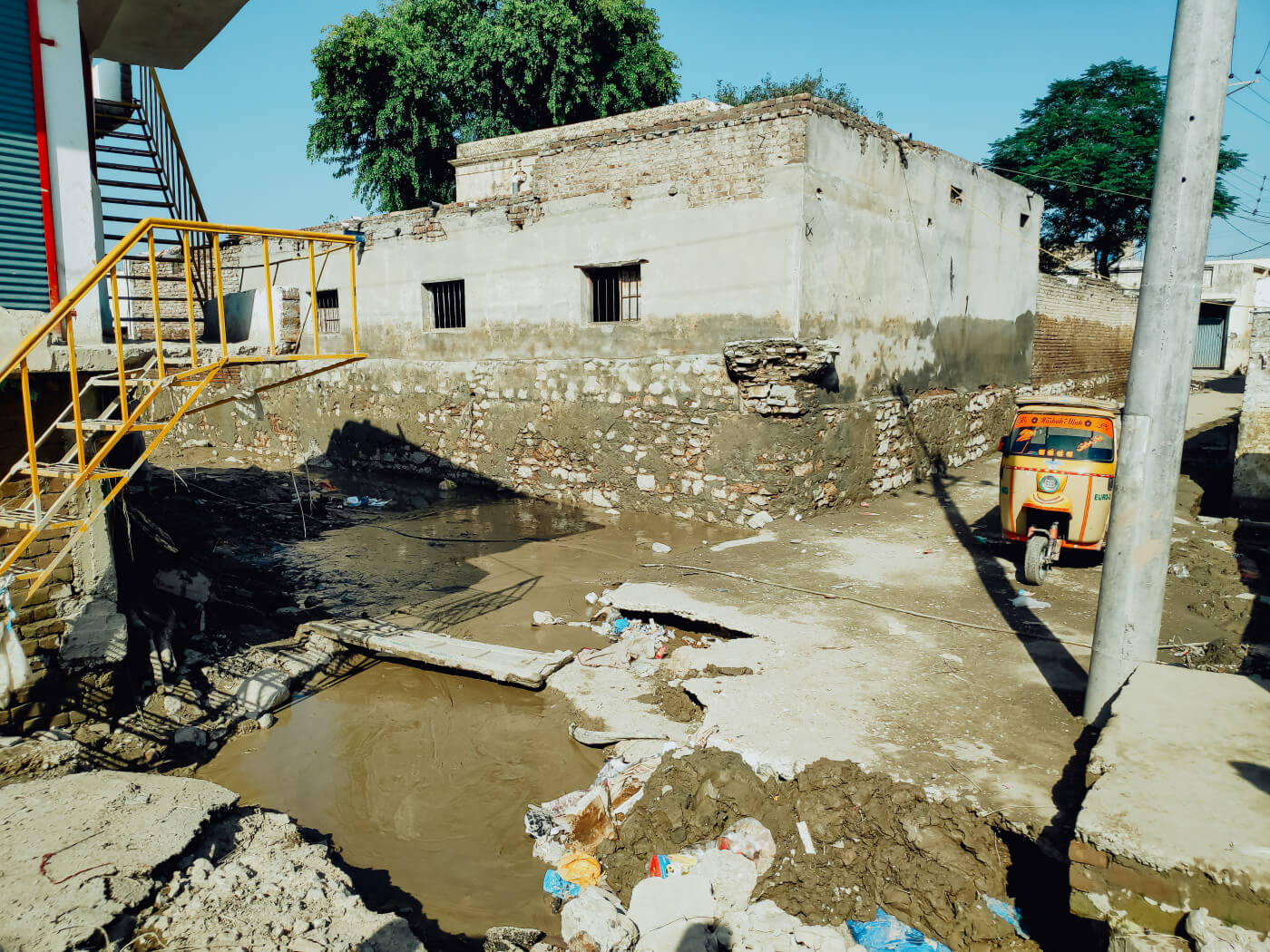
Image caption: Water damage to people’s homes, broken roads, paving and concrete leaving pockets of 1ft deep water.
Tomorrow I am flying back home to the UK, and as I sit here in my air conditioned hotel room, the one thought that won’t leave my mind is the unbearable heat I felt in the flood affected areas we visited. Out in the open right now, there are people who are still stranded under the hot burning sun without any shelter or shade. Have you ever experienced a heat so intense that your phone shuts down with a heat warning? Both the phones I had with me to take photos with did exactly that, which was a small but devastating reminder that whilst our humanitarian relief work will almost certainly be difficult over the coming weeks, for the people living out in the open whose lives have been destroyed by the floods, this same heat may eventually kill them before aid ever reaches them.
/
Support our work today to ensure that those affected by the floods receive the long-term and strategic care and support they need. Your donations will be vital in changing and saving lives.
To find out more about how we are serving Pakistani communities in need during the floods, click here.
To support our medical response activities in Pakistan, donate here.
To keep up to date with our projects, make sure to share this article with your friends and family, follow us on social media (twitter, facebook, instagram, linkedin, tiktok) and subscribe to our mailing list here for regular updates and opportunities.

